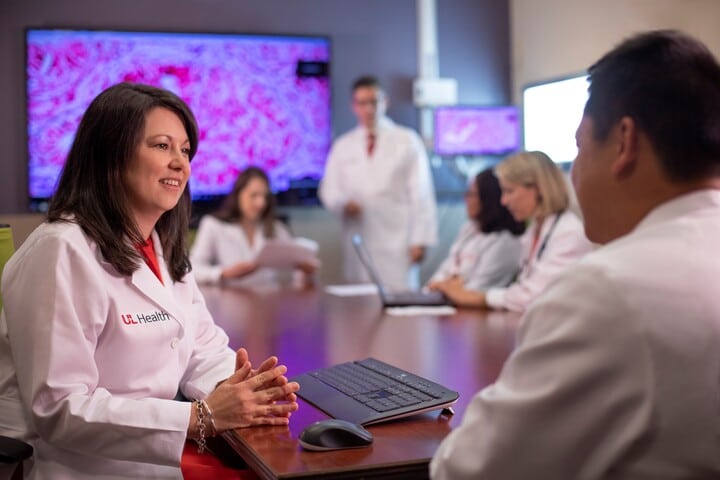
No one chooses when they will get cancer. No one chooses where they will get cancer. But everyone has a choice when it comes to choosing your cancer care team.”
With a breast cancer diagnosis, there are many choices to be made. How do you know if you’re getting the best care possible? Here are some key factors to look for when choosing your cancer care team.
Knowledge
“The most important thing I want to impart to patients is knowledge,” Dr. Beth Riley, a breast medical oncologist and deputy director of Health Affairs at UofL Brown Cancer Center, said. “There are a lot of choices when it comes to oncology treatment. There are different ways to achieve the same goal, but those treatments may have different side effects and different long-term outcomes. I’m passionate about educating my patients about the nature of their tumor and their treatment options so they feel empowered to make the best decision.”
Innovative, Personalized Treatment
Advanced precision medicine allows your cancer team to carefully examine the unique, molecular structure or “personality” of your cancer to customize treatments and target the cause.
“The most exciting thing in oncology right now is immunotherapy,” Dr. Riley said. “It will change the outlook of oncology moving forward.”
UofL Brown Cancer Center is one of the first places where immunotherapy was used for melanoma (skin cancer).
Immunotherapy works by stimulating the immune system to recognize the cancer and destroy it. Most of us are probably having cancer develop in our bodies every day, except that our immune systems recognize those abnormal cells and are able to kill them. When cancer develops, sometimes it’s able to trick the immune system, like a stealth fighter jet, it flies under the radar and the immune system isn’t able to recognize it. When a patient is given immunotherapy, it paints a target on that stealth fighter jet’s back and tells the immune system to recognize and kill it. That’s how immunotherapy works. It uses our own immune system to destroy the cancer.
Access to Clinical Trials
“Immunotherapies that we first tested against melanoma have now been found to prolong the survival of patients suffering from multiple types of cancer, including breast cancer,” Dr. Jason Chesney, director of UofL Brown Cancer Center, said.
Dr. Riley, said, “In those tumor types where immunotherapy has not provided as much benefit, we’re working very hard to develop clinical trials to see how to manipulate the tumor or the treatment to improve the rates of success.”
“Right now, immunotherapy doesn’t work for everybody,” Dr. Kelly McMasters, surgical oncologist and chair of the Department of Surgery, said. “Trying to make it work for everybody is work for the future and the research that needs to be done is being done right here in Louisville at UofL Brown Cancer Center.”
Multidisciplinary Academic Specialists
“At UofL Brown Cancer Center, we offer a multidisciplinary approach,” Dr. Nicolas Ajkay, a breast surgical oncologist and director of the Multidisciplinary Breast Clinic, said. “If you had breast cancer in the 1970s, you would get a mastectomy and that was it. Today, treatment of breast cancer requires multiple specialties: a breast surgeon, medical oncologist, and radiation oncologist. Our team collectively designs the best plan of action for each patient based on their unique diagnosis.”
UofL Brown Cancer Center features many academic specialists, concentrating on one type of cancer. “I may not be the right person to treat your colon cancer or lung cancer, but I am the right person to treat your breast cancer, because that’s what I do day in, day out,” Dr. Riley said.
With strong working relationships, our multidisciplinary teams make sure your care is managed with the expertise of those who specialize in your cancer diagnosis.
Comprehensive Support
In addition to the team treating cancer itself, it’s important to find a team who can address your other medical concerns that may coincide with cancer treatment. Because breast cancer affects approximately 10 percent of women in their childbearing years and it can affect her fertility, the HER Program was developed at UofL Brown Cancer Center for women 45 or younger with breast cancer.
The program also brings together experts in sexual health, cancer rehabilitation, genetic counseling, high risk conditions and survivorship. Other support services, including those for children and caregivers, are also available through the M. Krista Loyd Resource Center.
Already have a cancer care team? Ask for a second opinion.
“Innovation happens at UofL Brown Cancer Center,” Dr. Riley said. “We have a curiosity and a desire to answer unanswered questions and find undiscovered treatments in a particular cancer type. Not only can we provide different avenues of treatment, but even if you’re already in treatment, we can provide a second opinion. Sometimes a second set of eyes on a problem is important, especially when you’re talking about cancer care.”
Call UofL Brown Cancer Center at 502-562-HOPE (4673).









